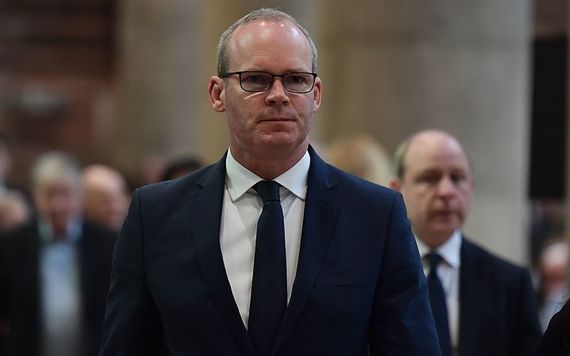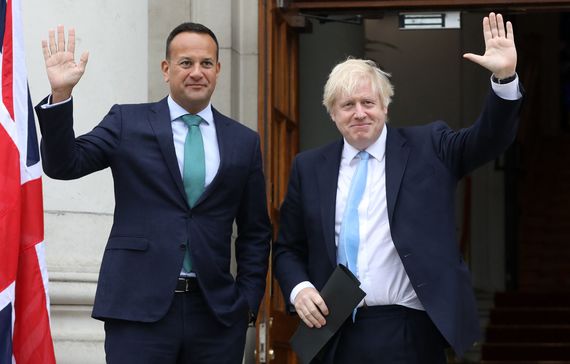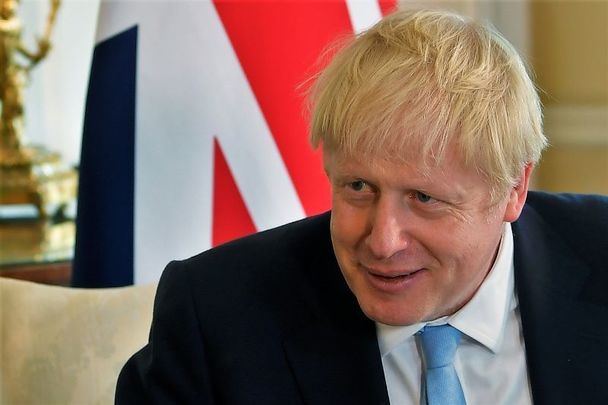With Brexit now just six weeks away, it's time for us to start talking seriously about the border.
You know, the one that was never supposed to happen again, the one that we would never allow under any circumstances, the one that was so appalling it was anti-Irish to even contemplate it.
Well, in the last couple of weeks it’s suddenly become okay to start discussing the possibility of a border again. The unmentionable is creeping into the official discourse. Clarifications are being made. Heavy hints are being dropped.
Read more: Brexit Boris needs to make major Irish choices ahead of deadline
Both Taoiseach Leo Varadkar and the Minister for Foreign Affairs Simon Coveney are now changing their tune. This started when Varadkar, who prides himself on being a politician who always tells it like it is, admitted to a meeting of British and Irish business leaders a couple of weeks ago that there may well have to be checks on goods crossing the border after Brexit, and that some of these checks would have to take place “near the border.”

Minister for Foreign Affairs Simon Coveney.
This was much further than he had gone before and such candor is welcome, even if the taoiseach is very late with it. Maybe he felt that trying to bluff the business leaders would be a step too far at this stage. But it’s only weeks since he was saying the exact opposite.
Also singing loudly from the same no border hymn sheet over recent months was Simon Coveney. If anything Coveney was even more adamant, wrapping the green flag around himself as he repeated that there could never be a border of any kind here again.
Now he also has been "clarifying" the reality of what may lie ahead, and last week was admitting that "temporary" checks might be necessary and that they would be "close to the border."
To be fair to the two of them we should point out that everyone was at the no border stuff a few months ago, not just members of the government but Fianna Fáil, Labour, independents and above all Sinn Féin—and in fairness to the Shinners, they're still at it!
Read more: Brexit Boris to seek UN help in New York
This head-in-the-sand nonsense went on endlessly over the past year even while the likelihood of a hard Brexit was rapidly increasing and some commentators, this one included, were warning that a border was inevitable unless we softened our position and helped the British find a solution that would avoid one.
At the time anyone who suggested that we needed to modify our stance on the backstop to make this possible—as this column was doing regularly—was accused of being unpatriotic.
Varadkar and Coveney stuck to the mantra that there can never, ever be any kind of border in Ireland again no matter what kind of Brexit happens—no hard border, no soft border, no invisible border, no cameras, no checks, no border of any kind, either at the border or anywhere else.

Irish leader Leo Varadkar and British PM Boris Johnson.
They kept at it even when the withdrawal agreement that former British Prime Minister Theresa May had negotiated with the EU came unstuck in the House of Commons because of the backstop. And they kept at it even when Boris Johnson took over as prime minister, although they were sounding much less certain as time went on. Now, faced with reality, they have shifted into reverse.
Last week Fine Gael had a party think-in down the country, and the taoiseach was quizzed on radio afterward about whether he was still guaranteeing that there would never be a border again, or if a border would be necessary to protect the EU Single Market and our place in it.
His response was weak, to say the least. If there is a no-deal Brexit we will have "no choice," he said. "That's the position we have been put in."
This raises the question of exactly who is putting Ireland in this "position." And the answer, as we have been predicting here for months, is that it's the EU.
It's very simple really. Ireland has a choice—staying in the Single Market and having some kind of border when the U.K. leaves or refusing to have any kind of border and being excluded from the Single Market. We can't have it both ways.
Read more: Confused by Brexit? Here's everything you need to know
All the political parties here agree that our future lies in the EU and the Single Market because so much of our prosperity depends on that. If there is a no-deal Brexit we will take whatever steps are necessary to protect our place in the Single Market. And that will mean "checks" on trade between north and south, which is the government's euphemistic way of saying there will be a border of some kind.
Exactly what these "checks" will be and whether they will be at or "close to" the border is currently the subject of increasingly intensive discussions between the government and the EU, talks that are going in secret on behind closed doors. The sudden shift in the government's public stance on the issue clearly indicates that the EU side—the officials from the EU Commission whose job it is to protect the integrity of the Single Market—is taking a hard line.
This is not because of any lack of sympathy for the Irish position. Rather it is an insistence that there is no room for fudging or half measures when it comes to protecting the Single Market.
There are no exceptions, no exemptions, no special arrangements for any EU member: you're either in or you're out and there has to be an effective border all the way around the Single Market. The danger of cross-border leakage without one is too great, and any weakness in the system would be exploited.
If the system is not watertight here, the first country to suffer the consequences would be Ireland. If a few truckloads of hormone beef or chlorinated chicken or pharmaceuticals that don't meet EU standards are imported into the U.K., cross to Northern Ireland, are then driven through a porous border into the south (which is inside the EU) and then on to a ferry and they arrive at a port in mainland Europe, what would happen?
Once they are detected there would be uproar. Soon it would mean that all trucks coming from the south of Ireland would be stopped and checked at EU ports. Given our huge agri-food exports to the EU that would be a disaster for us. Exports from Ireland could be stopped or at least subject to rigorous checking and long delays.
It would mean that very quickly we would be treated like a sort of third country rather than a full member of the EU and the Single Market. We can't have that, so if there is a no-deal Brexit then we need to have some kind of non-porous border in Ireland that works with total effectiveness.
Nor is it just a problem for the agri-food sector. Leakage of global goods from the U.K. across the border into Ireland and onwards into the EU would have much wider implications. It could lead to all Irish goods being checked at European ports, eroding our position as a full member of Single Market which could have very serious consequences for Foreign Direct Investment here.
No one wanted this situation to emerge, not us, not the EU and not even the British. But we are where we are, as politicians like to say, and we have to deal with that.
The real pity is that if we had shown some flexibility over the past two years we might never have got to this point. If we had agreed a time limit to the backstop there was every chance that the third time May put her withdrawal agreement deal to Parliament it would have passed.
Instead of being reasonable we stuck to the other part of the mantra which was that "a backstop with a time limit is not a backstop at all." The reality is that with the two-year transition period a five-year limit could have given everyone a seven-year space to find an answer to the problem.
Not only did we shoot ourselves in the foot (or in the head as this column said at the time) but we helped to bring down May and are now left to deal with Johnson and his hardline Brexiteers.
If we had helped May get her deal through, the withdrawal agreement would now be in place and the U.K. would be leaving in an orderly fashion with far less damage to Ireland. Instead, we are now facing a possible no-deal crash out by the U.K. which would be catastrophic for us.
Even at this late stage, it may still not be too late to rescue the situation. This week Johnson and his Brexit minister were in Luxembourg for private talks with the president of the EU Commission Jean Claude Juncker and the EU Brexit negotiator Michel Barnier.
Nothing much was said after the meeting apart from the two sides restating their positions. But intensive discussions are going on behind the scenes.
Both sides want to make a deal. But rescuing the situation means that the EU must stop pretending that it's up to the British alone to come up with an alternative to the backstop. And it means that Ireland must immediately start facing reality instead of simply repeating the same old no border, no changes to the backstop mantra.
We could still offer a five-year time limit on the backstop and encourage the EU to do a bit of tweaking to May's agreement so that Johnson could accept it and present it at home as a great new deal. With a time limit in place, there is every chance that Johnson would get a revised withdrawal agreement through Westminster.
Above all, we need to take the initiative on this and stop hiding behind the pretext that it has to be a matter for the EU as a whole and therefore our hands are tied and we can sit on the fence. We need to abandon our blind faith in the EU sorting the mess out because they can't be trusted.
Anyone who thinks that is harsh needs to remember that when Juncker addressed the Irish Parliament last year he was asked if he could guarantee that the EU would never impose a border of any kind in Ireland, and he said yes. Now his officials are telling the Irish government there is no alternative to some kind of border if there is a hard Brexit.
Read more: United Ireland supported by 51% in Northern Ireland, new poll finds




Comments